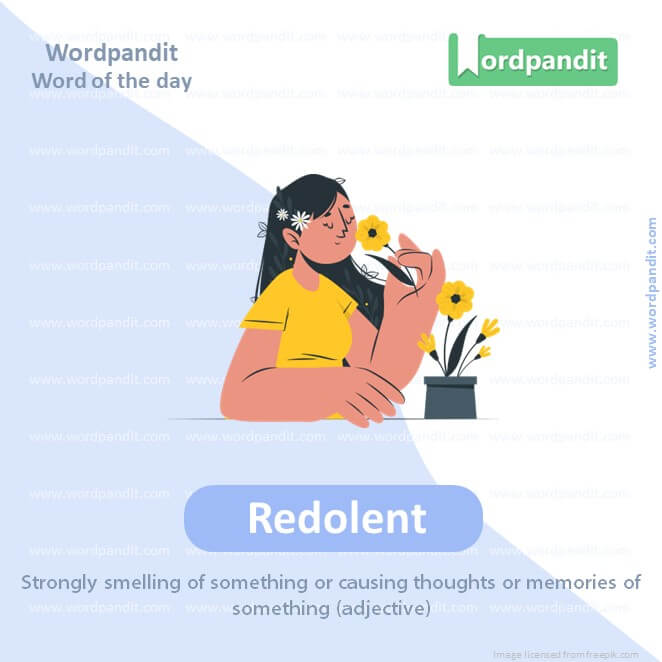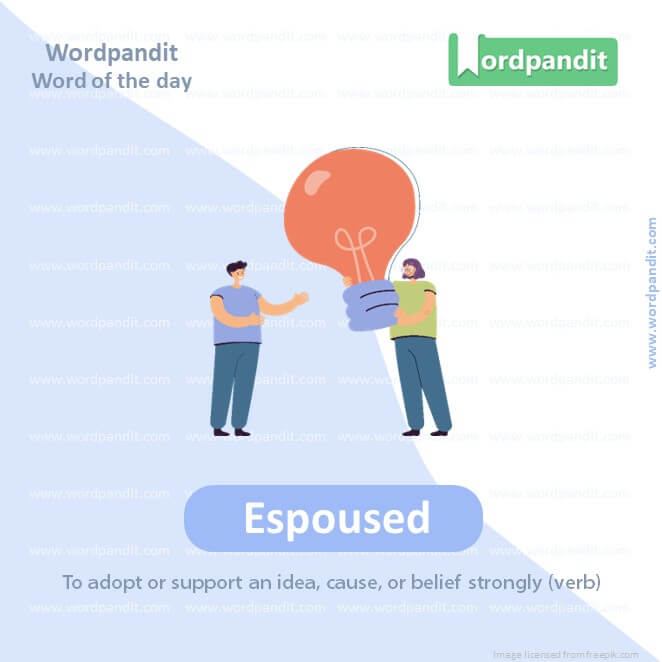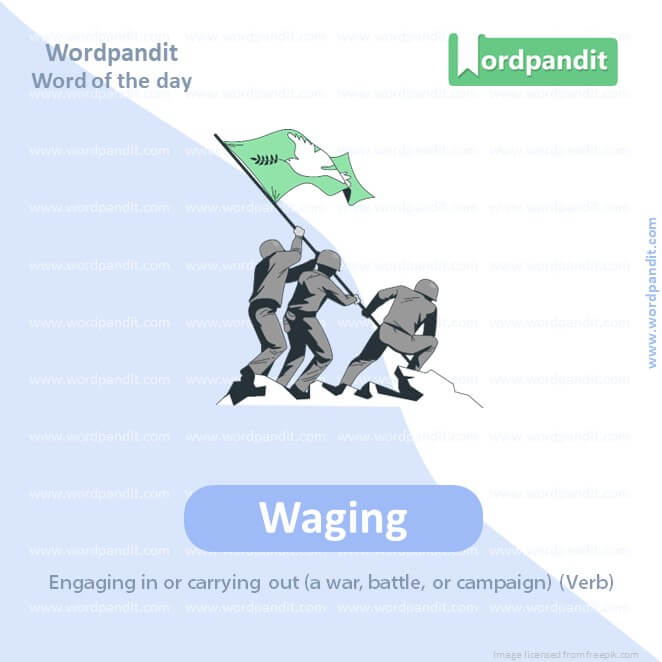Daily Vocabulary Words: List of Daily Used Words in Leading Indian Newspapers
Hi there. Welcome to this special section @ Wordpandit. Our endeavour here is straightforward: highlighting daily vocabulary words that you would come across in leading newspapers in the country. We have included the following newspapers in our selection:
• The Times of India
• The Economic Times
• Hindustan Times
• Mint
• Indian Express
We are putting in extensive work to develop your vocabulary. All you have to do is be regular with this section and check out this post daily. This is your repository of commonly used words; essentially, we are posting a list of daily used words. Hence, this has significant practical application as it teaches you words that are commonly used in leading publications mentioned above.
Visit the website daily to learn words from leading Indian newspapers.

WORD-1: Ascend
CONTEXT: The very word “conservatism” has a “timid” sound, complained renowned Austrian-British political philosopher F A Hayek. Yet, like him, many were surprised to see it ascend the political ladder in country after country.
SOURCE: Explanatory Paragraph
EXPLANATORY PARAGRAPH: Imagine you’re climbing up a ladder to get to the top of a slide at the playground. Each step you take gets you higher and higher until you reach the top. That climbing up motion is what “ascend” means. It’s like going up, up, up, whether it’s stairs, a hill, or even flying up into the sky!
MEANING: To go up or climb to a higher position (verb).
PRONUNCIATION: uh-SEND
SYNONYMS: Rise, Climb, Mount, Soar, Elevate, Scale, Uprise
USAGE EXAMPLES:
1. The hot air balloon began to ascend into the early morning sky.
2. She ascended the stairs to reach the rooftop garden.
3. The hikers ascended the mountain despite the challenging trail.
4. The company’s profits continued to ascend each quarter.

WORD-2: Redolent
CONTEXT: How is it that this name “redolent of passive obedience of the past” — as Kenneth Minogue wrote in his review of John Micklethwait and Adrian Wooldridge’s book The Right Nation.
SOURCE: Explanatory Paragraph
EXPLANATORY PARAGRAPH: Think about when you walk into a room where someone is baking cookies, and the yummy smell makes you think of baking with your grandma. That strong, lovely smell that reminds you of something is what “redolent” means. It’s like a scent that takes you back to a happy memory or place.
MEANING: Strongly smelling of something or causing thoughts or memories of something (adjective).
PRONUNCIATION: RED-uh-luhnt
SYNONYMS: Fragrant, Aromatic, Scented, Perfumed, Sweet-smelling, Odoriferous
USAGE EXAMPLES:
1. The kitchen was redolent with the aroma of baking bread.
2. The perfume was redolent of spring flowers.
3. The old library was redolent of leather and wood.
4. The air was redolent with the scent of pine trees.

WORD-3: Espoused
CONTEXT: As we see in history, dictators like Hitler and Mussolini openly espoused socialism.
SOURCE: Explanatory Paragraph
EXPLANATORY PARAGRAPH: Imagine if you really, really liked the idea of cleaning up parks and told everyone that it’s a great thing to do. You’re showing that you believe in this idea and support it. That’s what “espoused” means: to really support or believe in an idea or cause.
MEANING: To adopt or support an idea, cause, or belief strongly (verb).
PRONUNCIATION: ih-SPOUZD
SYNONYMS: Adopt, Embrace, Champion, Support, Advocate, Uphold
USAGE EXAMPLES:
1. She espoused the cause of environmental protection passionately.
2. The leader espoused the principles of democracy in his speech.
3. The organization espoused a policy of inclusivity and diversity.
4. He has long espoused the benefits of a healthy diet.

WORD-4: Prosperity
CONTEXT: They created economic prosperity and social stability.
SOURCE: Explanatory Paragraph
EXPLANATORY PARAGRAPH: Think about a time when you felt really happy because you had everything you needed, like lots of toys, good food, and a warm house. “Prosperity” is when people have everything they need to be happy and comfortable, like money, food, and a nice place to live. It’s like having a big treasure chest of everything that makes life good.
MEANING: A state of being successful, flourishing, or thriving
PRONUNCIATION: pros-PER-i-tee
SYNONYMS: Wealth, Success, Affluence, Abundance, Riches, Well-being, Flourishing
USAGE EXAMPLES:
1. The country enjoyed a period of prosperity and growth.
2. The new policies were designed to bring prosperity to the region.
3. The family’s prosperity was evident in their luxurious home.
4. She wished her friend prosperity and happiness in the new year.
WORD-5: Stoutly
CONTEXT: The conservatives who occupied the right chamber of the parliament stoutly opposing the aggressive enthusiasm of the revolutionaries, often called themselves liberals.
SOURCE: Explanatory Paragraph
EXPLANATORY PARAGRAPH: Imagine you’re standing up against a strong wind, trying not to be pushed over. You’re standing firmly and not moving, no matter how hard the wind blows. That’s what “stoutly” means—being very strong and determined, not giving up or getting pushed around easily.
MEANING: In a strong, firm, and determined way (adverb).
PRONUNCIATION: STOUT-lee
SYNONYMS: Firmly, Bravely, Strongly, Resolutely, Determinedly, Courageously
USAGE EXAMPLES:
1. She stoutly defended her decision in front of the critics.
2. The old tree stoutly withstood the fierce storm.
3. He stoutly refused to give up on his dreams.
4. The soldiers stoutly held their ground against the enemy.
WORD-6: Riveting
CONTEXT: In their riveting account of the history of American politics, Micklethwait and Wooldridge conclude that irrespective of the Democrats and Republicans rotating power, America remains a conservative nation at its core.
SOURCE: Explanatory Paragraph
EXPLANATORY PARAGRAPH: Think about watching your favorite cartoon or movie, and it’s so interesting that you can’t take your eyes off the screen, not even to eat your snacks. That’s what “riveting” means—it’s so exciting or interesting that you want to pay attention to it and nothing else.
MEANING: Extremely interesting or exciting, holding one’s attention completely (adjective).
PRONUNCIATION: RIV-it-ing
SYNONYMS: Fascinating, Captivating, Engrossing, Compelling, Enthralling, Absorbing
USAGE EXAMPLES:
1. The book was so riveting that she read it in one sitting.
2. The documentary provided a riveting look into the lives of astronauts.
3. His riveting performance earned him a standing ovation.
4. The mystery was riveting, full of unexpected twists.
WORD-7: Statism
CONTEXT: Barring issues concerning sexual morality and statism in economic activity, the classical liberals embrace several of those issues that the conservatives do.
SOURCE: Explanatory Paragraph
EXPLANATORY PARAGRAPH: Imagine a big group where one person decides all the games you play, the rules, and even when you get snacks. In a way, “statism” is like that but for a whole country. It’s when the government has a lot of control over everything that happens in the country, including businesses and laws.
MEANING: The practice or policy of giving a central government significant control over social and economic affairs (noun).
PRONUNCIATION: STAY-tiz-um
SYNONYMS: Governmentalism, Centralization, Regulation, Authority, Control
USAGE EXAMPLES:
1. The debate centered around the benefits and drawbacks of statism.
2. Statism was seen as a way to manage the country’s economic challenges.
3. Critics of statism argue for more individual freedom and less government control.
4. The era was marked by a shift towards statism in policy-making.
WORD-8: Anarchy
CONTEXT: While a word like conservatism stood for rational and progressive ideas, a benign word like liberalism came to be identified with anarchy, thanks to this bunch of radicals.
SOURCE: Explanatory Paragraph
EXPLANATORY PARAGRAPH: Imagine if at school, there were no rules at all. No one to tell you when to eat lunch, when to go outside, or even how to play games. Everything would be super confusing and messy, right? That’s what “anarchy” is like. It’s when there are no rules or people in charge, and everything can become very chaotic.
MEANING: A state of disorder due to absence or nonrecognition of authority or other controlling systems (noun).
PRONUNCIATION: AN-ar-kee
SYNONYMS: Chaos, Lawlessness, Disorder, Disarray, Turmoil, Confusion
USAGE EXAMPLES:
1. Without the teacher, the classroom descended into anarchy.
2. The film depicted a future world of anarchy and destruction.
3. The sudden collapse of the government led to anarchy in the streets.
4. He believed that anarchy could lead to a more free and just society.

WORD-9: Waging
CONTEXT: At a time when global conservatives are waging fierce battles against radical left anarchists, with whom even Western liberals are highly uncomfortable, a powerful country like India standing by that political movement definitely means a lot for them.
SOURCE: Explanatory Paragraph
EXPLANATORY PARAGRAPH: Think about playing a video game where you’re trying to win against the bad guys. You have to keep fighting and trying your best to beat them. “Waging” is kind of like that but in real life. It means to carry on a battle or struggle to achieve something, like trying to win a game or make something better.
MEANING: Engaging in or carrying out (a war, battle, or campaign) (Verb)
PRONUNCIATION: WAY-jing
SYNONYMS: Conduct, Engage in, Undertake, Carry out, Prosecute, Pursue
USAGE EXAMPLES:
1. The country was waging war against its neighbors.
2. Activists are waging a campaign to change the law.
3. She was waging a battle against the disease with courage.
4. The organization is waging a fight to protect endangered species.
WORD-10: Impairment
CONTEXT: She has mild cognitive impairment and some age-related decline.
SOURCE: Explanatory Paragraph
EXPLANATORY PARAGRAPH: Think about if your toy car didn’t have one of its wheels. It wouldn’t be able to move as well as it should, right? “Impairment” is when something is not working as well as it normally does. It could be anything from a toy, to someone’s ability to see or hear, to anything that’s not functioning properly.
MEANING: A reduction in strength, quality, or ability to function normally (noun).
PRONUNCIATION: im-PAIR-ment
SYNONYMS: Deterioration, Disability, Damage, Reduction, Weakening, Diminishment
USAGE EXAMPLES:
1. The accident caused an impairment in his ability to walk.
2. Visual impairment can be corrected with glasses or contact lenses.
3. The disease led to a significant impairment of her memory.
4. Testing revealed an impairment in the device’s performance.
Vocabulary Exercises
In the language learning fitness regime, ‘vocabulary exercises’ are vital workouts that flex cognitive muscles. These exercises help reinforce new vocabulary, enhance memory, and promote active application. However, to reap the full benefits of ‘vocabulary exercises’, it’s crucial to tackle them with the right strategy and mindset.
To begin with, when approaching ‘vocabulary exercises’, it’s important to view them as opportunities to explore words’ usage. Completing these exercises isn’t simply about ticking off correct answers; it’s about deepening the understanding of the words in various contexts which aids in their active usage.
Leveraging technology can greatly enhance the efficiency of ‘vocabulary exercises’. Digital apps often provide a wide range of ‘vocabulary exercises’ that range from fill-in-the-blank exercises to match-the-column tasks. These digital platforms offer instant feedback and keep you engaged while turning learning into an interactive experience.
Incorporating ‘vocabulary exercises’ in your daily learning routine helps consolidate your vocabulary knowledge. Set aside specific time slots every day to commit to these exercises. Regular revisions steps up retention and keep the learning curve ascending.
Personalizing ‘vocabulary exercises’ also proves beneficial. This could involve creating your own sentences using the learnt vocabulary or drawing visuals that associate with each word. These personalized exercises stimulate more profound learning and enhance the recall ability.
To conclude, ‘vocabulary exercises’ are essential tools in your language learning toolkit. They provide a platform for active learning, promote better recall, and, when paired with technological tools, make learning more engaging and effective. Furthermore, incorporating these exercises into your daily routine and personalizing them heightens their impact. Remember, ‘vocabulary exercises’ are not merely tasks, they are stepping stones guiding you towards your language mastery goals.













